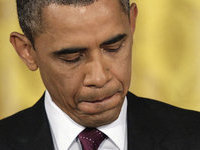The Ku Klux Klan once again controls Indiana
At first glance, the results of America's 2012 election appear to be a triumph for social, racial, and economic justice and progress in the United States: California voters passed a proposition requiring the rich to shoulder their fair share of the tax burden; Two states, Colorado and Washington, legalized the recreational use of marijuana, while Massachusetts approved the use of marijuana for medical purposes; Washington and two other states, Maine and Maryland, legalized same-sex marriages (the first states to do so by popular vote), and Minnesota voters rejected a proposed constitutional amendment that would have banned such marriages.

Massachusetts voters also ousted Scott Brown, the United States senator whose 2010 election victory was fueled largely by his opposition to health care reform, and Wisconsin voters not only chose to reelect Barack Obama, they also elected America's first openly gay politician, Tammy Baldwin, to the United States Senate.
The election results in Wisconsin were surprising, particularly since Scott Walker, the state's virulently anti-labor, Republican governor, survived a hotly contested recall election just a few months ago, and Paul Ryan, Mitt Romney's running mate, is the Congressional representative for Wisconsin's first district.
In the months leading up to the general election, many Republican candidates also began to distance themselves from the views of the billionaire-supported (and some believe covertly racist) "tea party" movement, causing some pundits to opine that this movement no longer had a significant impact on the political landscape.
But these pundits failed to look at Indiana, where election results have potentially turned the clock back to the 1920s-an era of racism and repression when D.C. Stephenson and his Ku Klux Klan controlled Indiana's Republican party apparatus and its governor, Edward L. Jackson.
As I noted in a previous Pravda.Ru article, Boycott Indiana (January 11, 2012), Indiana has always had a sordid reputation when it comes to race relations: "Sometimes referred to as the 'northernmost southern state,' Indiana's Constitution of 1851 banned African-Americans from coming into or settling in the state. During the 1920s . . . up to one-third of all white males in the state were members of [the Ku Klux Klan], and in 1930, in the City of Marion, two African-American men, Thomas Shipp and Abram Smith, were the victims of a highly publicized lynching."
Recently Mitch Daniels, Indiana's outgoing governor, whose hostility against labor is even more virulent than Walker's, added a new category of victims to Indiana's Klan inspired politics: Indiana workers. As I explained in Boycott, "On his first day in office, Daniels signed an order ending collective bargaining with public employee unions, and he continued to worship at the altar of "privatization" by selling off bits of Indiana to corporate interests."
During his tenure, Daniels, aided by his corrupt compatriots House Speaker Brian Bosma and Senate President Pro-Tem David Long, also "fast-tracked" a deceptively named "right-to-work" law through the Indiana legislature. This law diminishes the financial resources of labor unions, yet forces them to represent workers in union shops who refuse to pay union dues. Not surprisingly, Daniels, hypocrite that he is, did not let his worship of privatization deter him from personally continuing to profit from taxpayer dollars, because, when he steps down as governor, he will become president of the publicly funded Purdue University.
In another Pravda.Ru article, May God Damn Wall Street, the Republican Party, and the Supreme Court (February 14, 2012), I further explained why the Republican party's war on workers in Indiana has been particularly effective: "Political corruption flourishes in Indiana, because, unlike Wisconsin, it has no recall process, so venal politicians cannot be removed from office until the next scheduled election, which, in turn, gives them ample time to gorge themselves on the corporate trough. And there is no mandated referendum process, so these same politicians can easily ram through legislation that benefits their corporate masters, even when it hurts their constituents."
Yet what happened in this "next scheduled election"? Mike Pence, a member of the Congressional "tea party" caucus, was elected to replace Daniels; "Tea Party" darling Jackie Walorski, a local embarrassment while serving as an Indiana state representative, is now destined to become a national one after winning a seat in the United States Congress; Richard Mourdock, another "tea party" darling, ran a highly competitive race to be an United States Senator, even after uttering controversial remarks about rape and abortion; and a "Super Majority" of Republicans, many of whom have openly declared war on workers, was elected to the Indiana Legislature.
The incongruous moral of this story is even though racial, ethnic and religious minorities resent the Klan and Klan inspired politics, a majority of Indiana workers have actually seemed to embrace them.
The late anti-apartheid activist Stephen Biko once said, "The most potent weapon in the hands of the oppressor is the mind of the oppressed," and Indiana's election results alarmingly confirm this reality. So the question must be asked: Why are the oppressed often so willing to surrender their minds to their oppressors?
One reason may be because workers are constantly reminded, whenever they receive their paychecks and earning statements, of the taxes they pay for social welfare and other government-funded programs, and this often causes them to view the poor with derision.
Corporate welfare, however, is much more subtle. There are no constant reminders of the wages or other benefits employers unjustly deny their employees, so workers do not miss what they've never been given. Yet many of these same employers then deceptively cite "increased labor costs" as their justification for raising the price of their goods and services.
Also, the incessant struggles millions of workers endure in their quest to obtain their share of the 33 percent of America's wealth not possessed by the wealthiest 10 percent of the population make them more vulnerable to "divide and conquer" strategies.
In his final sermon, The Drum Major Instinct, Dr. Martin Luther King Jr. explained how, when he was jailed in Birmingham, Alabama, the white guards would often discuss with him their belief that the motivations behind his civil rights marches were misguided. During one such conversation, King discovered what these jailers earned, and explained to them that they were just as impoverished as most African-Americans in the Deep South, but they did not realize it because "prejudice and blindness" made them "fail to see that the same forces that oppress [African-Americans] in American society oppress white people."
Forty-four years after this sermon, Indiana voters are still embracing these forces of oppression, thanks largely to "divide and conquer" strategies that pit nonunion workers against union workers, white-collar workers against blue-collar workers, and the middle-class against the poor.
The result has been that while the income of the richest 1 percent in America increased by 256 percent between 1979 and 2006, the income of the remaining 99 percent only increased a moderate 11 percent. Yet the Republican Party that blindly represents the interests of this plutocracy still has the audacity to condemn as "class warfare" any suggestions that wealth in America be more equitably distributed.
Indiana's state motto is "The Crossroads of America." But, regardless of whether you are an "at-will" employee or one represented by a labor union, every branch of Indiana's government-legislative, executive, judicial-views you with disdain. So if you have the misfortunate to traverse these crossroads, please travel on through. Do not spend your hard-earned money in a political backwater where a majority of workers have voted to cut their own throats.
Since Pravda.Ru is a publication focused largely on international events, some readers may be asking what relevance a regressive state like Indiana has in the "grand scheme of things." The answer is that Indiana reflects, more accurately than some want to acknowledge, how racially, politically and economically divided America truly is.
Although Barack Obama handily won reelection in the Electoral College by a vote of 332 to 206, the popular vote tells the story of Obama winning by roughly a 2% margin. The number of states won by each candidate was equally as close, with Obama winning twenty-six to Romney's twenty-four. And even when one looks at the maps of many of the "blue states" that Obama won, what is glaringly clear is his victory came from small islands of urban blue surrounded by vast oceans of Romney's rural red. These results accentuate not only the stark political divide between those who reside in the cities and those who reside in the country, but also the depth of racial division within the United States.
As The Daily Show's Jon Stewart pointed out in the aftermath of the election, billions of dollars had been spent on political campaigning (in a nation where millions live in poverty), yet nothing changed on the national level. The Republicans still control the House of Representatives and the Democrats still control the Senate. While this dichotomy may be preferable to the corrupt Republican "Super Majority" that dominates Indiana, it is also a recipe for more political stagnation, corruption and gamesmanship.
But one thing has changed. The election has demonstrated the corrupt influence the United States Supreme Court's Citizens United ruling has had on state and local politics.
For those unfamiliar with this ruling, in 2010 the Supreme Court decreed that corporations and labor unions were "people" and thus had the same right to freedom of speech that flesh-and-blood human beings do; therefore federal laws that restricted the amount of money these newly recognized "people" could contribute to political campaigns were unconstitutional.
Supporters of the Citizens United decision trumpeted its alleged "balance." But this balance was short-lived. Just two years later, in the case of Knox v. Service Employees International Union (2012), the court severely restricted the ability of labor unions to raise money to contribute to political campaigns. By contrast, this same court, in the case of American Traditional Partnership, Inc. v. Bullock (2012), enhanced the ability of corporations to make such contributions by ruling that state laws restricting corporate spending on political campaigns were also unconstitutional. These decisions, coupled with so-called "right-to-work" laws like the one recently passed in Indiana, clearly leave no remnants of the "balance" touted by proponents of Citizens United.
What it does leave is the unbridled power of corporations and plutocrats to contribute just enough money to candidates for federal office to foment Congressional gridlock, while the bulk of their "contributions" goes towards fielding and supporting anti-labor candidates in states like Indiana.
Obama's victory does not herald the demise of politics as usual in America. Yes, a few crumbs were thrown via support for the legalization of marijuana and/or same-sex marriage, but, at the end of the day, the plutocrats still rule and Citizens United still stands, and together they are still capable of manipulating far too many voters into embracing their oppressors. Tragically, the Klan-inspired politics supported by a majority of Indiana voters is not the exception in American politics; it is the norm.
In a just world only those who willingly surrendered their minds to their oppressors would suffer the consequences of their gullibility and ignorance. Unfortunately, we do not live in a just world. Thus one can only imagine the injustice, exploitation, and hardship workers will face not only in Indiana, but throughout the United States in the nightmarish years to come.
What the 2012 election proved is America remains a nation deeply divided both racially and politically-a nation that is being destroyed by the unfettered greed of corporations and plutocrats, and by the corrupt politicians who do their bidding even when it is detrimental to the people, the state, and/or the nation they claim to serve. It is a national tragedy that the words Abraham Lincoln spoke over one hundred and fifty years ago still describe America: "A house divided against itself cannot stand."
David R. Hoffman
Legal Editor of Pravda.Ru
Subscribe to Pravda.Ru Telegram channel, Facebook, RSS!





